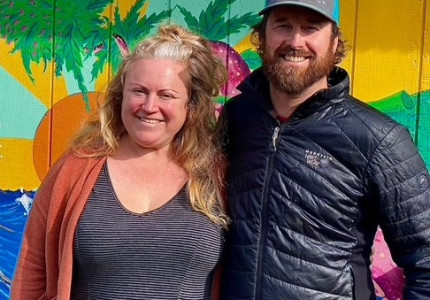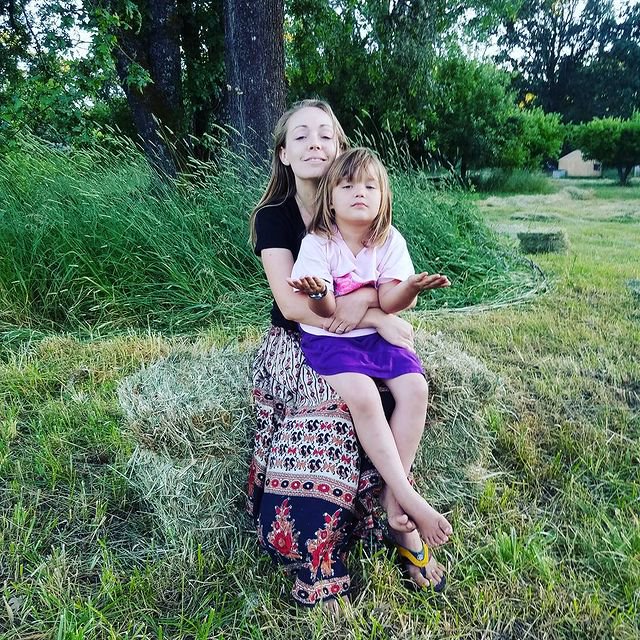 Renae Wells, her family, parents and nephews share their property, their passion for cannabis and their dreams for the future. Golden Cove Farm is hidden away in Covelo- a valley floor, 10-acre property she hopes will surmount the tremendous ups and downs of a fickle cannabis industry.Renae Wells, her family, parents and nephews share their property, their passion for cannabis and their dreams for the future. Golden Cove Farm is hidden away in Covelo- a valley floor, 10-acre property she hopes will surmount the tremendous ups and downs of a fickle cannabis industry.
Renae Wells, her family, parents and nephews share their property, their passion for cannabis and their dreams for the future. Golden Cove Farm is hidden away in Covelo- a valley floor, 10-acre property she hopes will surmount the tremendous ups and downs of a fickle cannabis industry.Renae Wells, her family, parents and nephews share their property, their passion for cannabis and their dreams for the future. Golden Cove Farm is hidden away in Covelo- a valley floor, 10-acre property she hopes will surmount the tremendous ups and downs of a fickle cannabis industry.
Renae’s parents are the beginning of her story.
“My dad was a successful musician in the LA Rock and Roll scene. He worked with Laura Brannigan, Pablo Cruise and the Doobie Brothers. After he and mom married, they adopted four children and moved us to Mendocino County in 1988 to get us out of the Southern California scene. They wanted to get back to nature and grew vegetables down there and here.” Renae’s parents adopted a total of six children during the ‘80’s to the ’90’s.
 “When we moved to Covelo in 1991, Mom started to grow cannabis- first indoors, and then outdoors. Dad became a music teacher and just retired after 30 years,” Renae continues.
“When we moved to Covelo in 1991, Mom started to grow cannabis- first indoors, and then outdoors. Dad became a music teacher and just retired after 30 years,” Renae continues.
“Our first gardens were at another location when I grew up and had to be camouflaged. We definitely dealt with the War on Drugs. Luckily, we were never busted, but we were very afraid. We were small enough and smart enough to stay safe.” Renae had friends who died during home invasion robberies or attacks by cartels. She recalls being coached by her parents. “Only specific friends were allowed to come over. Unfortunately, I had to pass that to my children as well- to think carefully before we spoke or invited someone new into our lives. The fear was real.”
Renae’s daughter Tc’ahe is studying Sustainable Environmental Design at UC Berkeley. “When Tc’ahe discussed the War on Drugs with classmates- the helicopters, SWAT teams, CPS detaining kids at school after families got busted, home invasions, the fear- her fellow students didn’t believe her. Theysaid, ‘That’s Third World stuff!’” Tc’ahe notes that some students had no idea there were still Native Peoples living on reservations in California.
 Renae’s family had a 15-acre ranch. In addition to cannabis, they rescued horses, creating a nonprofit organization. Cannabis funds were used to support the family and the Dancing Cloud Equine Rescue and Sanctuary. “We’d gently tame the horses and worked with them to find them good homes.”
Renae’s family had a 15-acre ranch. In addition to cannabis, they rescued horses, creating a nonprofit organization. Cannabis funds were used to support the family and the Dancing Cloud Equine Rescue and Sanctuary. “We’d gently tame the horses and worked with them to find them good homes.”
Renae became a young mother at 19. Adding cannabis to her income was a logical step.
“I was working two and three jobs. I thought, ‘If I grew a small garden, I could be home with my daughter.’ I started with six plants. That’s all we needed. Mom was my teacher and inspiration. We were raised on natural and organic food. She had me in the garden since I was 5, teaching us kids how to start seeds and grow our food. She taught us about soil We used chicken manure, horse manure, compost and hay from the farm.”
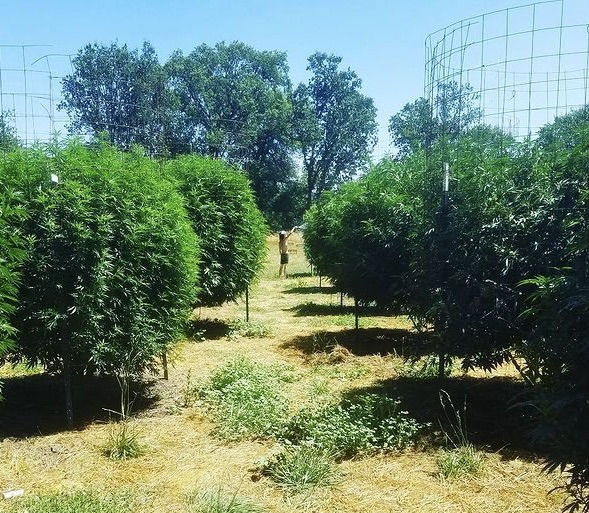 “Mom was fearless. She believed what she was doing was for a good reason. She believed in the medicine and healing of the people.”
“Mom was fearless. She believed what she was doing was for a good reason. She believed in the medicine and healing of the people.”
In 2017, Renae and her children endured a complicated divorce, and for a time, she also divorced herself from farming to financially support her family, providing business administration services for local businesses.
“I leased my land for a few years, removing myself from farming. During that time, I attended school and did office work, but I missed the plants. Last year, my spouse Jack Overend and I got back into the garden.”
Foreseeing legalization, Renae began attending meetings sponsored by Emerald Grown. “That was when I ‘came out’ as a farmer. I was making my presence known, publicly and online, and I was terrified! But being in that group with other farmers- who were as afraid as I was- helped us derive strength from each other. I was one of the first people in Round Valley to register with the Water Board. It was healthy to talk with others about how to prepare for what was coming.” And everyone knew what was coming: a regulatory tangle that no other form of agriculture has ever had to wrestle with.
“I knew I couldn’t afford to hire an accountant, a bookkeeper and a METRC consultant. You must have multiple incomes to live this remotely. So I attended business school, built up the farm and registered with Fish and Wildlife and all the other required agencies. Not one person was doing that in Round Valley. I felt in my gut this is what I needed to do- to build something lasting for my family, to support us in the near term and keep law enforcement at bay.”
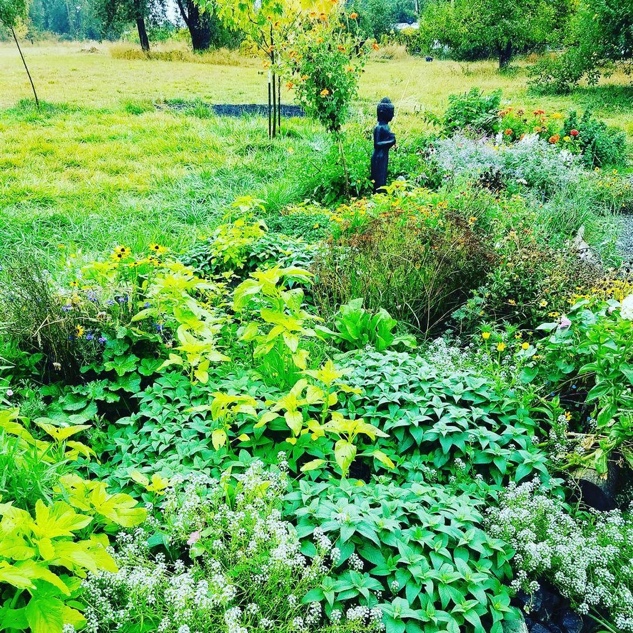 Renae learned the complexities of METRC and provided office and business administration support for other farms. “I took a job doing METRC for Family First’s ten farms here in Covelo. I jumped right in. It was stressful, but I learned a lot visiting the sites and doing the work every day. I loved working for Family First. Many people who worked for Family First were like family because we’d grown up together. They truly cared about families in the Valley while growing quality products.”
Renae learned the complexities of METRC and provided office and business administration support for other farms. “I took a job doing METRC for Family First’s ten farms here in Covelo. I jumped right in. It was stressful, but I learned a lot visiting the sites and doing the work every day. I loved working for Family First. Many people who worked for Family First were like family because we’d grown up together. They truly cared about families in the Valley while growing quality products.”
Her tenacity paid off.
“I have an actual license from the County of Mendocino! I didn’t have to go through the portal to renew. My CEQA review has gone through an administrative permit process. I got a notice of exemption from CEQA that’s submitted to the DCC. They’re reviewing it. I might receive my annual license. I know of maybe 10 others in Mendocino County that made it to this point. Luck and hard work led me down this path.”
Renae is grateful to reconnect with her garden in a hands-on way, with her family nearby to continue the legacy.
“When I was in our garden from seed to harvest, it was very apparent the plants responded to me as much as I did to them. They’re here to help us.”
 Renae plants seeds around March 1st, placing them in soil she purchases from the local feed store.
Renae plants seeds around March 1st, placing them in soil she purchases from the local feed store.
“We nurture them in the greenhouse, sex them and then place them in the native soil. Our soil is so rich. When I first moved here, the grass was thick and tall. It was a permanent pasture -part of a cattle ranch. We have pigs and chickens. We use fish hydrolysate, but don’t use any fancy hydro-store nutrients. I learned about nutrients when I worked at Covelo Building and Farm Supply, especially why horse manure was good for the plants and soil. Last year, we used a micronized nutrient called Corn Steep from Earth Crew, which is a cornmeal byproduct- an inexpensive, effective fertilizer.”
“For mulching, we used to bale our field. Now we do sheet mulching using compost, horse manure and local straw. We have an artesian well fed by the aquifer. We pipe the overflow to a little metered pond and have holding tanks for backup during the summer fire danger months. We don’t need any Ph adjustments and use less water than most because we’re in the ground. We track our water usage, mix any amended soil back into the ground and winterize our holes to prepare for the following season. We’re always building our soil.”
Renae grows three different strains timed three weeks apart and purchases her seeds from the Humboldt Seed Company and Purple City Genetics.
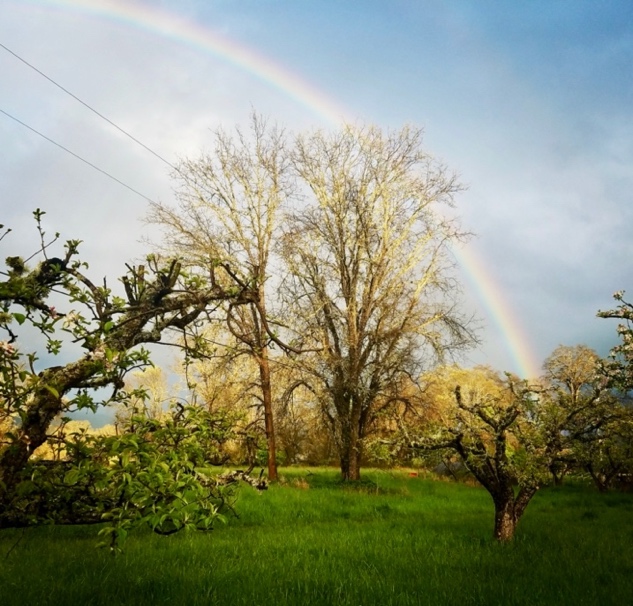 “Our family comes together to clean and harvest the plants. It’s so nice to just walk outside to go to work. My kids come home from school and I’m right here for them.”
“Our family comes together to clean and harvest the plants. It’s so nice to just walk outside to go to work. My kids come home from school and I’m right here for them.”
“Several years ago, I attended the Oregon Cannabis Business Council with Karen Byers- one of my mentors. Cannabis was legal there, but not here. Their prices were bottoming out to $300 per pound, but they bounced back. They lost many small farmers and so shall we. If something doesn’t change in the next year, maybe we’ll have to move on. I don’t want to lose our property or not be involved with cannabis. It would break my heart. But I’m not giving up.”
The community of local cannabis colleagues is an unending source of support for Renae, particularly Casey O’Neill of HappyDay Farms. “Casey gives me strength. He has planted seeds of hope in my heart and in my mind. Monique Ramirez is also a champion advocate for all Mendocino County farmers, but particularly for Round Valley Cannabis. Much love and respect to both of them.”
Hella Jelly is Golden Cove’s entry for the Kure Mendocino Invitational.




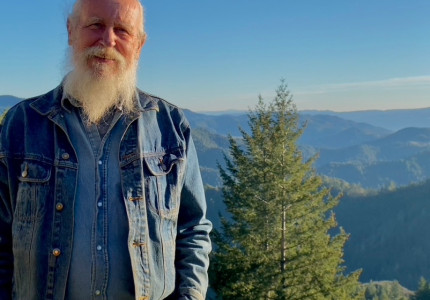
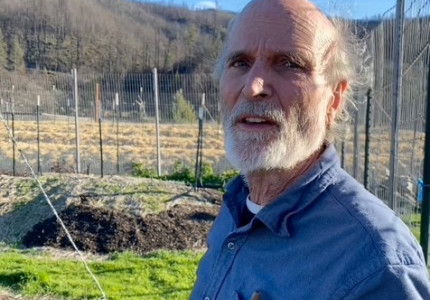
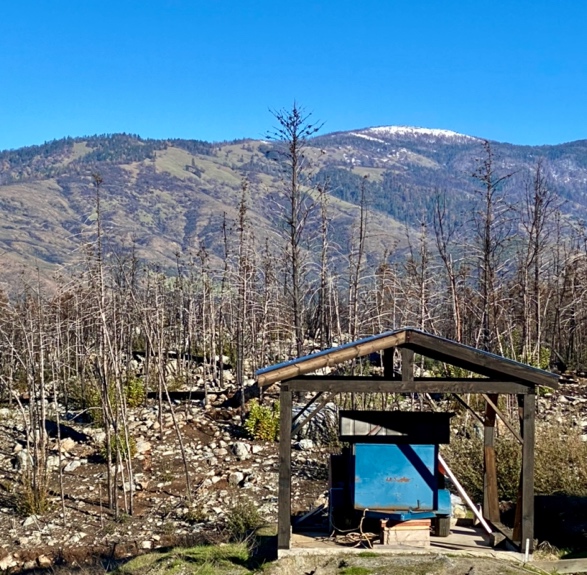 “I’ve only quit smoking three times since 1964,” he smiles.
“I’ve only quit smoking three times since 1964,” he smiles.